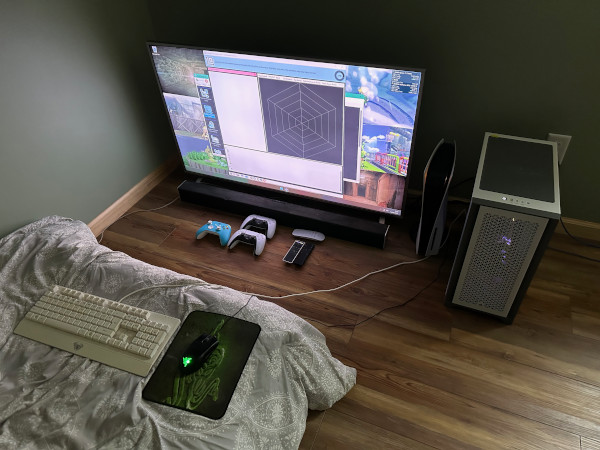
The cooler is so large it has to be seen in person to be believed-- it's maybe six Rubik's Cubes hooked together: straight out of clown world. And these current-gen chips run notoriously hot even with such a monster device, with two giant heat sinks and two fans bolted on to it! As soon as I saw how large it was, I immediately knew I would need to put as many components in place as possible, before installing the CPU.
I put the RAM in first. The cooler wound up being so enormous installed, that it barely clears the top of the DIMMs! The cooler also blocks access to the fastest NVMe slot-- so it was a good thing I installed the NVMe drive beforehand. I could have put the drive into one of the PCI-Express 4.0 slots, but my general philosophy is to use the fastest slots available: I even plug my keyboard into a USB 3 port, because why not.
As a brief aside, this makes me appreciate the engineering in the PlayStation 5: look at how small it is compared to the PC, and think about how few fans it has, and how quiet it is, while still offering really nice looking games with solid performance (albeit locked to 30 fps in a lot of cases).
But back to the PC: the system POST'ed immediately. I plugged in my 32 meg. USB thumb drive with the latest BIOS update, used the UEFI interface's "Q-Flash" option... flash went without a hitch. After flash I flipped to the one-and-only XMP profile for my RAM-- 6000 MHz-- and rebooted. All seemed fine. I then swapped to the Windows 11 bootable install USB drive I'd made earlier, and away I went. Once I had Windows 11 installed and all patched, I installed Sandra to confirm that everything was working.
Back to the cooler now-- in the end it does its job: I ran the Sanda CPU benchmark gauntlet, which does prolonged periods of full-bore stress testing, with all threads maxed out. The peak temperature I saw was 95.6 C. This worst-case scenario is super hot by conventional standards, but within the design spec of the chip as a zillion threads on Reddit and elsewhere explain. The system remained completely stable throughout.
In terms of performance, the chip scored a 16.93 kPT overall, which is right inline with what the tool expected. I once busted a lying Asus and forced them into a motherboard RMA back in 2001 thanks to Sandra-- ever since then I've used it to verify that each component in my systems are working up to spec.
The Samsung 980 Pro NVMe drive scored spectacularly: 6753 MB/s and an overall score of 8.92 kPT, which was higher than the 7.02 that the tool was expecting.
The RAM scored a 55.286 GB/s in the bandwidth test, 59.3 ns in terms of latency, with an overall score of 2.09 kPT. The bandwidth number seemed a little low, so I poked around the UEFI interface some more, and ran across these options: "Low Latency Support" and "XMP/EXPO High Bandwidth Support". Enabled, I re-ran the benchmark: 61.431 GB/s, and 53.9 ns. So you definitely want those settings turned on!
Overall I'm very pleased with the system's performance. I'll have full benchmark results from the RTX 4070 Ti once I'm able to procure one, hopefully in January. In the meantime I'll install a few games such as Cyberpunk 2077, then shut the PC down until I'm able to get the video card.